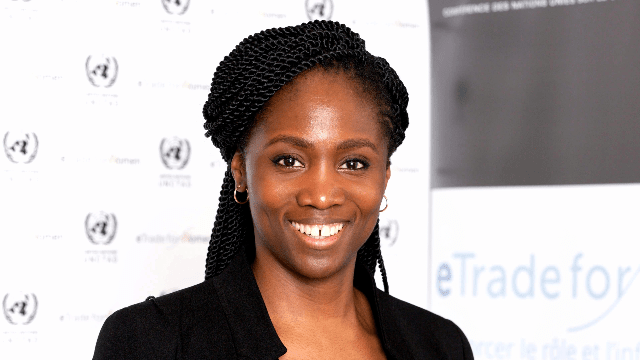Candace Nkoth Bisseck (E12): "Rebuilding Your Life After an Abusive Relationship Is Possible"
Candace Nkoth Bisseck (E12) has published the first volume of Miracles sans frontières [Miracles Without Borders], in which she reveals how she fled an abusive relationship in Abidjan and reinvented her life in Switzerland, thanks in particular to ESSEC.
ESSEC Alumni: What is your book about?
Candace Nkoth Bisseck: It deals with a particularly painful period of my life, an abusive relationship in Abidjan from 2006 to 2009, with a violent man I call ‘Scar’. I describe the spiral which dragged me into this dangerous and frightening situation, but also how I escaped, thanks in particular to my admission to ESSEC. While some parts may shock readers, my first goal was to convey a message of hope. I want my experience to serve as a practical example, a source of inspiration for anyone going through difficult times, by showing that with faith, courage, a network and some strategic decisions, you can rewrite your destiny.
EA: Looking back, are you able to analyse how your ex-partner managed to entwine you in his grip?
C. Nkoth Bisseck: To begin with, I was in an extremely vulnerable situation when I met Scar. I had barely turned 20, had just lost several loved ones and to escape my grief, I was trying to recreate a family nucleus. Scar then aroused my sympathy. He presented himself as a victim of his own family history and certain previous relationships, and claimed he wanted, like me, to build a new home. Lastly, he played the role of my saviour; he was ultra-present, generous, constant and thoughtful in the early days. He only revealed his true self once our relationship was solidly in place. My lack of experience and naivety placed me at his mercy.
EA: How did you manage to escape him?
C. Nkoth Bisseck: This also happened in several steps. The first trigger was when I tried to return to my studies in Abidjan, a decision Scar contested violently. I realised at that moment it was not healthy that my partner should refuse to see me progress and, incidentally, draw closer to or exceed his own professional level. Then followed a series of incidents when his growing instability and aggressiveness finally made me fear for my life. Combined with a fervent desire to unleash my full potential, this refusal to die needlessly gave me the courage I needed to plan my escape. I thus began the admission procedure to enter major French schools.
EA: You explain that ESSEC played a key role in your new-found freedom...
C. Nkoth Bisseck: On a very practical level, my admission provided me with the golden ticket to flee the Ivory Coast without having to retreat to my native country, Cameroon, an option I was not particularly keen on because I really needed to move forward and not backwards. On a mental level, passing the entrance exam also boosted my self-confidence. I discovered perseverance, strength and skills I didn’t know I had in me.
EA: After ESSEC, and once free of your relationship, you decided to act for women’s empowerment. What actions did you lead in this context?
C. Nkoth Bisseck: Specifically, I founded Black Roses Mentors to help women flourish and prosper in their job or entrepreneurial project and beyond, by offering coaching, training and mentorship. I have thus accompanied hundreds of women worldwide and worked alongside organisations such as the L’Oréal Foundation.
EA: You also managed the initiative eTrade for Women for the United Nations.
C. Nkoth Bisseck: My role was to build an international community of female digital business owners in developing countries, with the ultimate aim of shaping a more inclusive economy in those regions. I therefore facilitated constructive dialogue with policymakers, designed and led training programmes, and contributed to the creation of cross-border opportunities for collaboration between programme members.
EA: This action is also linked to digital science, another area of your expertise. How did you develop this expertise?
C. Nkoth Bisseck: I began getting into digital science through my hobbies as a law student in Cameroon, by blogging and leading online communities. I then worked for a company in Abidjan which distributed telecommunication products and services. Once at ESSEC, I followed the CPI (Innovative Product Creation) programme and worked with a multi-disciplinary team to develop La Poste’s digital transition strategy. After graduating, I joined the digital innovation consultancy Polyconseil, before being recruited to manage a start-up within the African e-commerce giant Jumia, in Cameroon.
EA: Now based in Switzerland, you combine your varied experience through your organisation Innoa Consulting. Can you describe your activities?
C. Nkoth Bisseck: With Innoa Consulting, which is based in Geneva but has international reach, I focus on leadership and inclusion in the workplace. My aim is to help business leaders shape teams and cultures which are inclusive, productive and forward-looking, through coaching, advice, training and workshops, among other activities. I also occasionally provide institutions with my expertise on the use of entrepreneurship and digital innovation as tools for development.
EA: Do you continue to maintain ties with Cameroon and the African ecosystem?
C. Nkoth Bisseck: Yes, absolutely. For several years and as part of various initiatives I’ve been mentoring high-potential young people from diverse backgrounds in Cameroon, to boost their leadership skills, foster their personal growth and promote positive change in their communities. I also chair the African Professionals Network Switzerland (APNS), which encourages networking, personal development and collaboration on Swiss-African impact projects. Lastly, I sometimes work with international foundations and institutions such as the European Commission or the African Union on matters relating to female entrepreneurship, innovation and leadership as growth levers for Africa. And not forgetting my long-term commitment to the Obama Foundation’s Leaders Africa programme.
Interview by Louis Armengaud Wurmser (E10), Content Manager at ESSEC Alumni
Do you want more quality content about the ESSEC community? Join us now!

comments0
You don't have the rights to read or add a comment.
Suggested Articles

